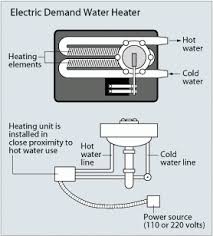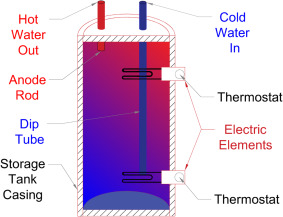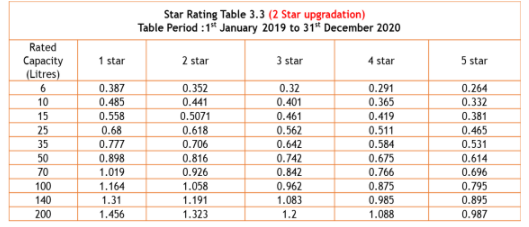Water heating is the process of heating up water above its initial temperature. This can be done with the help of an energy source like fire or electricity. Electric water heaters are the most commonly used devices to meet water heating needs. Water heaters are used for many purposes e.g. domestic, commercial, industrial. The size and type of a water heater varies depending on its purpose and place of application. This article will solely focus on electric water heaters that are used for domestic purposes.
Types of domestic water heaters
Electric water heaters for domestic purposes are basically classified into two categories
i) Instant electric water heaters
Heating process in an instant electric water heater takes place in the following manner: water from the inlet pipe enters into the heat exchanger where it gets heated instantly and the heated water will be delivered through the outlet pipe.

Image 1:Instant water heaters
ii) Storage water heaters
In storage water heaters, the heating elements, which are made up of nichrome or less corrosive materials, are present at the bottom of the storage tank. When the water heater is switched on, the heating elements heat up the water stored in the tank and deliver hot water through the outlets whenever required. These types of water heaters use electricity continuously to heat the stored water even when no water is tapped which means that as long as the switch is turned on, the heating element will be working, , regardless of whether there is water in the heater or not. Once the main power is turned off, there will be no electricity consumption. Therefore, a considerable amount of energy will be wasted through standby heat loss if the water is not tapped. Hence, these kinds of water heaters are ideal for situations where plenty of hot water is needed.
Standby heat loss
Standby heat loss is the amount of energy consumed by a tank-type water heater to maintain the temperature of water, when no hot water is being drawn from the tank.

Image 2:Storage water heaters
Factors deciding electricity consumption of water heaters
- Initial water temperature
- Volume of water used
- Required temperature of water to be used
- Thermostat temperature (ideal temperature is 60 degree celsius)
BEE Star labeling
- The Bureau of Energy Efficiency (BEE) provides star labels for various electrical appliances including storage water heaters.
- Up to 5 star ratings are given. More stars, the higher it’s electricity efficiency. However, each year, technology evolves, and so do the power efficiency figures of various electrical equipment. BEE therefore updates its energy ratings on a yearly basis. The energy efficiency factor can be tested using one of two methods developed by BEE.
- For storage water heaters, star ratings are given on the basis of standing loss (kWh/24hour/45°C difference), as explained in the Table - 1.
Standing loss:Standing loss is the measurement of the energy consumption of a filled water heater, calculated when connected to the electrical supply and when no water is drawn for 24 hours after reaching steady state conditions which means the heating element inside the water heater ,reaching sufficient temperature to heat water after switching on the heater.

Table 1: Star rating based on standing loss
Energy saving tips
- Always purchase BEE star-labelled water heaters
- Lower the thermostat on your water heater (for every 12ºC reduction in temperature, you can save from 3%–5% on your water heating costs)
- Reduce the amount of water you use to shower.
- Fix leaks in your taps.
- The insulation of our water pipes reduces the loss of heat. We can use preinsulated pipes or we can use polyethylene foam to insulate existing pipes.
Solar water heaters
Even though there are a lot of energy-saving tips for conserving power in electric water heaters, switching to solar water heaters is a much more energy efficient choice. . This is because the heating happens at zero operating cost (with the help of sunlight). The only drawback is that a backup is required on cloudy days or in case of increased demand. The government supports the use of solar energy and provides a lot of rebates and benefits for solar water heating.
Conclusion
While using an electric water heater, use it in an energy efficient manner. However hard we try, it will be impossible to run an electric water heater on zero electrical energy. It is inevitable that what we use will be reflected in our electricity bills.On the other hand, by switching to solar water heaters, we significantly reduce our electricity consumption and the money we spend on power bills. This in turn, will also go a long way to protecting our environment.
Add new comment